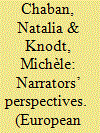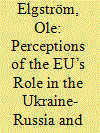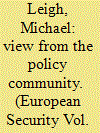| Srl | Item |
| 1 |
ID:
168957


|
|
|
|
|
| Summary/Abstract |
The role of newsmakers as intermediaries in the shaping of external perceptions and reception of narratives advanced by different actors remains sparse in EU studies. This contribution fills this gap and addresses the personal images of the EU of newsmakers. We contribute to the understanding of those personal perceptions and their link to professional values of audience interest, newsworthiness and objectivity in reporting the EU. The article will demonstrate that all journalists perceive EU coverage in their respective locations are led by local priorities. Negative views of the EU as a weakening, biased, ineffective, elitist and arrogant actor are dominant. Arguably, they create conditions for the birth and dissemination of Euro-distant and even Euro-sceptic media narratives. The article will explain why this is the case while drawing on political/ideational and business/financial explanations.
|
|
|
|
|
|
|
|
|
|
|
|
|
|
|
|
| 2 |
ID:
159781


|
|
|
|
|
| Summary/Abstract |
This article focuses on how the European Union’s (EU) mediation activities during the Russia-Ukraine and Israel-Palestine conflicts are perceived by local elites. Our analysis is based on recent interviews with decision makers in Ukraine, Israel and Palestine. Consistent with this special issue, we investigate perceptions of EU roles, strategies and effectiveness. We suggest that the EU’s relation to the parties may affect their perceptions of EU conflict mediation efforts. Specifically, we expect that the EU is perceived as a biased mediator in both cases due to perceived close relations to one or more conflict parties. However, contrary to our expectations and widespread assumption in mediation theory, while such a bias exists, we found it is not perceived as a main cause of EU ineffectiveness. Other factors, including the prominence of other mediators and internal EU disunity, are perceived as more detrimental to EU efficacy.
|
|
|
|
|
|
|
|
|
|
|
|
|
|
|
|
| 3 |
ID:
168961


|
|
|
|
|
| Summary/Abstract |
Reflecting on the results presented in articles in this special issue, European leaders should take greater account of external perceptions in crafting the European Union's strategic narrative and guiding its actions. Failure to do so has impaired external policies like the Euro-Mediterranean Partnership, the European Neighbourhood Policy and Eastern Partnership. Leaders emerging from the Arab uprisings perceived the EU as complicit with their countries’ former anciens régimes and Russian leaders see EU support for democracy and the market economy in former Soviet states as duplicitous and instrusive. Awareness of such perceptions should be filtered into EU decision-making, without validating views that European officials and diplomats consider misleading.
|
|
|
|
|
|
|
|
|
|
|
|
|
|
|
|